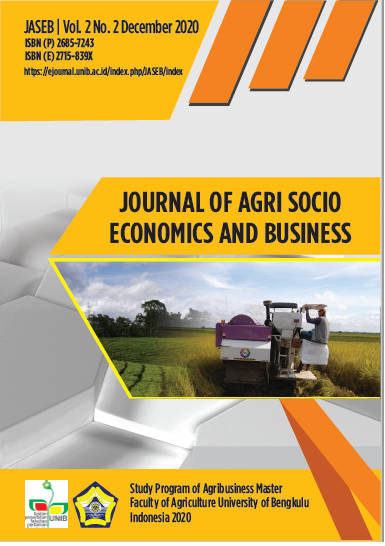Main Article Content
Abstract
Eventhough wetland rice productivity in Lebong Regency has already been quite high, the
need for rice continues to increase along with population growth. This condition need to be
handled by increasing rice production, especially the production of upland rice. This study
aims to study the crop management in rice farming implemented in Lebong Regency and
analyze the production and productivity of rice for every crop management. Research data
are primary data and secondary data collected through Focus Group Discussion involving
20 farmer groups . Qualitative data are analysed descriptively by examining their
farm management focused on variation role of crop and session. The study of crop
management pattern in Lebong Regency can be concluded as follows: (1) land
management depends on the readiness of farm workers and peasants to work and provide
capital so that the cultivated land is limited to the availability of capital owned by farm
workers which is influenced by socio-economic, technical, and market factors, (2) less
optimal maintenance of centre of production, especially in irrigated rice fields, so that
efforts should be made to increase production and productivity, and (3) lack of synergy in
developing centre of rice production for staple food providers as a measure of achievement
of food security.
Article Details
An author who publishes in the Journal of Agri Socio Economics and Business agrees to the following terms:
Author retains the copyright and grants the journal the right of first publication of the work simultaneously licensed under the Creative Commons Attribution-ShareAlike 4.0 License that allows others to share the work with an acknowledgement of the work's authorship and initial publication in this journal
Submission of a manuscript implies that the submitted work has not been published before (except as part of a thesis or report, or abstract); that it is not under consideration for publication elsewhere; that its publication has been approved by all co-authors. If and when the manuscript is accepted for publication, the author(s) still hold the copyright and retain publishing rights without restrictions. For the new invention, authors are suggested to manage its patent before published. The license type is CC-BY-SA 4.0.
Journal Agri Socio-Economics and Business is licensed under a Creative Commons Attribution-ShareAlike 4.0 International License.
References
- Asriani, Putri Suci, M. Mustopa Romdhon, Basuki Sigit Priyono, dan Bambang Sumantri. 2018. Pengukuran Kinerja 16 Program Unggulan Bupati Lebong Tahun 2018: Bidang Ekonomi, Ketahanan Pangan, dan Pertanian. Laporan Penelitian Kerjasama UNIB-Pemkab Lebong APBD 2018 (Dokumentasi LPPM UNIB. Tidak dipublikasikan.
- Dwiarsyah, Teguh, Mochamad Ridwan, dan Putri Suci Asriani. 2017. Peranan dan Kontribusi Sektor Pertanian dalam Struktur Ekonomi Kabupaten Lebong Provinsi Bengkulu. Thesis S2 Magister Perencanaan Pembangunan Fakultas Ekonomi dan Bisnis Universitas Bengkulu. Dokumentasi Perpustakaan UNIB. Tidak Dipublikasikan. http://repository.unib.ac.id /id/eprint/12614. Diakses pada Tanggal 18 Juli 2019.
- Dyah, Pujastuti Sulistyaning. 2017. Manajemen Usahatani pada Lahan Kering di Kabupaten Gunung Kidul Daerah Istimewa Yogyakarta. Prosiding Interdisciplinary Postgraduate Student Conference 3rd. Program Pascasarjana Universitas Muhammadiyah Yogyakarta(PPs UMY) : 274-278.
- Fajar, Muhammad. 2014. Identifikasi Sektor Unggulan Kabupaten Waropen 2013. https//:www.researchgate.net. Diakses Tanggal 16 Juli 2019 Pukul 21.5 WIB.
- Indonesia Agriculture Ministry. 2018. Basis Data Pertanian. http://www.pertanian.go.id. Diakses Tanggal 11 Januari 2019.
- Indonesia Statistic Biro. 2018. Lebong Dalam Angka. http://www.BPS.go.id. Diakses Tanggal 11 Januari 2019.
- Nduru RE, Situmorang M, Tarigan G. 2014. Analisa faktor-faktor yang mempengaruhi hasil produksi padi di Deli Serdang. Saintia Matematika. 2 (1): 71-83.
- Erythrina. 2010. Peluang Pengembangan IP Padi 400 di Lahan Sawah Irigasi. Iptek Tanaman Pangan 5 (1): 1-14.
References
Asriani, Putri Suci, M. Mustopa Romdhon, Basuki Sigit Priyono, dan Bambang Sumantri. 2018. Pengukuran Kinerja 16 Program Unggulan Bupati Lebong Tahun 2018: Bidang Ekonomi, Ketahanan Pangan, dan Pertanian. Laporan Penelitian Kerjasama UNIB-Pemkab Lebong APBD 2018 (Dokumentasi LPPM UNIB. Tidak dipublikasikan.
Dwiarsyah, Teguh, Mochamad Ridwan, dan Putri Suci Asriani. 2017. Peranan dan Kontribusi Sektor Pertanian dalam Struktur Ekonomi Kabupaten Lebong Provinsi Bengkulu. Thesis S2 Magister Perencanaan Pembangunan Fakultas Ekonomi dan Bisnis Universitas Bengkulu. Dokumentasi Perpustakaan UNIB. Tidak Dipublikasikan. http://repository.unib.ac.id /id/eprint/12614. Diakses pada Tanggal 18 Juli 2019.
Dyah, Pujastuti Sulistyaning. 2017. Manajemen Usahatani pada Lahan Kering di Kabupaten Gunung Kidul Daerah Istimewa Yogyakarta. Prosiding Interdisciplinary Postgraduate Student Conference 3rd. Program Pascasarjana Universitas Muhammadiyah Yogyakarta(PPs UMY) : 274-278.
Fajar, Muhammad. 2014. Identifikasi Sektor Unggulan Kabupaten Waropen 2013. https//:www.researchgate.net. Diakses Tanggal 16 Juli 2019 Pukul 21.5 WIB.
Indonesia Agriculture Ministry. 2018. Basis Data Pertanian. http://www.pertanian.go.id. Diakses Tanggal 11 Januari 2019.
Indonesia Statistic Biro. 2018. Lebong Dalam Angka. http://www.BPS.go.id. Diakses Tanggal 11 Januari 2019.
Nduru RE, Situmorang M, Tarigan G. 2014. Analisa faktor-faktor yang mempengaruhi hasil produksi padi di Deli Serdang. Saintia Matematika. 2 (1): 71-83.
Erythrina. 2010. Peluang Pengembangan IP Padi 400 di Lahan Sawah Irigasi. Iptek Tanaman Pangan 5 (1): 1-14.
